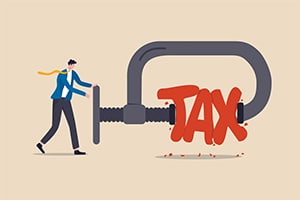
Business Advisory Services
Everything you need to help you launch your new business entity from business entity selection to multiple-entity business structures.
Hey - Our site just had a makeover and we are sorting through the hiccups!
Hey - Our site just had a makeover and we are sorting through the hiccups!

Everything you need to help you launch your new business entity from business entity selection to multiple-entity business structures.

Designed for rental property owners where WCG CPAs & Advisors supports you as your real estate CPA.

Everything you need from tax return preparation for your small business to your rental to your corporation is here.

WCG’s primary objective is to help you to feel comfortable about engaging with us
Posted Thursday, October 10, 2024
Table Of Contents
WCG blog contains articles and other cheeky items that are short, sweet and a bit sassy. They are designed to be quick reads about current small business tax deductions and other tax matters. As such, they might become outdated simply based on time or based on changing tax code. Just like email, the most recent post about a topic is probably the most accurate and current post (we try to alert you that a post supersedes an older post, but life on life’s terms gets in the way from time to time).
Want to go deeper a subject? Explore some of our other topics
July 4, 2025
Overview of the One Big Beautiful Bill (OBBB) Before we dive into the nitty gritty of this new bill, here
June 7, 2025
Key Takeaways The short-term rental (STR) loophole lets losses be treated as non-passive if average stays are 7 days or
March 30, 2025
Is it silly to write in the first-person? Probably. According to a 2022 Harvard Business Review article, a study of
February 26, 2025
There is a ton of chatter about time trackers and REPS logs including STR hours. Spreadsheets with dropdowns, conditional formatting,
February 26, 2025
URGENT: No later than March 21, 2025, FinCEN intends to issue an interim final rule that extends BOI reporting deadlines,
February 20, 2025
With state apportionment and tax return preparation, there are two issues at play- apportionment itself, and then state tax return
January 28, 2025
Jason Watson, Terra Plamp and Beth Buchanan just returned from Ahmedabad, India to meet with our 23-person team on the
January 26, 2025
Cost segregation or costseg as the cool kids say allows you accelerate depreciation (and therefore lower taxes and increase cash)
July 14, 2024
Dealing with taxes can be tricky, especially when it comes to IRS underpayment penalties. In 2024, these penalties are a
July 1, 2024
Why designate myself as a real estate professional? Aside from being something cool to tell the grand kids, let’s presume
June 13, 2024
Key Takeaways CRNAs working as 1099 contractors are business owners, making many tax deductions available that W-2 employees cannot use.
June 12, 2024
You are buying real estate for business or rental use. Usually, you can depreciate the entire purchase price, minus the
May 28, 2024
A lot of small business owners, especially solo operators, work from their home office. This is wonderful, however people change
April 25, 2024
We are just coming out of tax season with a stack of notes with mostly good ideas, and likely some
April 25, 2024
WCG CPAs & Advisors is thrilled to partner with BiggerPockets. Located in Denver, Colorado, BiggerPockets is the premier online resource for
February 21, 2024
As you consider your tax planning strategies this year, please be aware that you might live in a state that has
January 21, 2024
WCG CPAs & Advisors receives about 2-3 emails or phone calls (and the occasional text) per week from people saying, “I
December 18, 2023
You’ve decided to open that retirement plan personally or through your small business – what now? Or maybe your friends
October 3, 2023
While WCG clients are wonderful, occasionally a client of another CPA firm will ask us for advice. How should I
September 16, 2023
Yeah, you’re reading that right. Our website and various articles express ways to save on taxes, but they also had
September 2, 2023
For those parents who either over-funded a 529 college savings account or where the funds were never needed, there is
August 26, 2023
The IRS postponed a SECURE Act provision that would require all those 50 or older who also earn more than $145,000 to
September 21, 2022
Healthy relationships start with managing expectations, especially communications. Generally, WCG relies on emails and text messages as our initial communication
July 3, 2022
Summer is tax planning time and we get a lot of questions about solo 401k contributions, and whether they should
July 2, 2022
Tax planning strategies are commonly addressed in December as small business owners and other taxpayers start to freak out about
June 18, 2021
WCG has recently introduced a new bookkeeping function for business owners as your Fractional Controller. We will use Bench as
November 22, 2020
There has been a lot of activity over the last 6 months regarding PPP loan proceeds becoming taxable income or not. We’ll
July 8, 2020
The hot question since the passage of the Tax Cuts & Jobs Act of 2017 and Section 199A is, “Should
June 17, 2020
Updated May 13, 2020 (SBA says loans under $2M are safe harbor on need for funds) Updated May 17, 2020 (Treasury releases
May 22, 2020
The history of WCG CPAs & Advisors starts off like many CPA firms. Tina Watson obtained her CPA license in May 2003.
May 6, 2020
Online Tax Accountant We have put together a quick list of frequently asked questions involving the SBA’s Paycheck Protection Program
March 28, 2020
Update April 2, 2020 at 5:23PM (Treasury just released its final final guidelines)… no 1099s issued as payroll costs, and gross pay
March 21, 2020
Here we are on March 21, 2020. Many of us are sequestered in our home trying to figure out basic
March 17, 2020
Update March 20, 2020, Treasury Secretary has also extended the tax filing deadline from April 15 to July 15. Two
March 15, 2020
With everyone freakin’ out about the Coronavirus (and me recovering from Deschutes Virus from their amazing IPA), perhaps it is time to
January 3, 2020
The SECURE Act which stands for Setting Every Community Up for Retirement Enhancement of 2019 was signed December 20, 2019 as part
October 21, 2019
Small business tax deductions are critical for reducing taxable income. The tax code and the IRS basically say, “Hey, we
October 13, 2019
Recently we had a foot and ankle physician group in Rhode Island complete two different RCReports interviews to determine a
September 30, 2019
WCG (formerly Watson CPA Group) just recorded its first small business podcast on business entity formations and considerations, and we
September 8, 2019
Home is where the heart is. But as the economy shifts and embraces remote work, more and more people find
September 7, 2019
Having your LLC elect S corporation taxation is fairly easy. But like King George in Hamilton, “What comes next?” The S
September 3, 2019
One of the biggest headaches of electing to be taxed as an S Corp is calculating a reasonable shareholder salary.
August 21, 2019
The Section 199A deduction was derived from the Tax Cuts and Job Acts and, thanks to our Congress, is one
August 11, 2019
We are living in the age of the “side hustle.” Talk to ten of your friends and colleagues, and chances
August 11, 2019
Some say that the best nation is a “donation!” While that might make you laugh (and hopefully this blog post
May 28, 2019
Being designated a specified service trade or business, or SSTB for short, for some business owners can appear like punishment.
May 26, 2019
As mentioned elsewhere in our website and book, we encourage people to focus on building wealth and if they can
May 26, 2019
Many business owners ask if they should be cash or accrual when selecting the accounting method within their accounting package.
May 26, 2019
Exit strategies or succession planning usually consider employee ownership as a strong possibility. It is a difficult decision for most
April 29, 2019
On January 18, 2019 the IRS and the Treasury Department released the Section 199A final regulations, including some related guidance such as IRS Notice
February 22, 2019
Accountable Plans WCG (formerly Watson CPA Group) and our team of business consultants field a lot of questions about home
February 10, 2019
When comparing business activities on a Schedule C versus an S Corp election, one of the gripes is the reduction
January 20, 2019
Section 199A provides a huge tax deduction for small business owners. S Corps provide a huge tax reduction in the
January 19, 2019
Section 199A offers a 20% deduction for small business owners, but are rental properties considered a trade or business? The
January 19, 2019
The Tax Cuts and Jobs Act of 2017 created a new tax deduction for business owners (and others) called the
January 18, 2019
On August 8, 2018, the IRS published proposed regulations to help better explain the Section 199A Qualified Business Income Deduction including anti-abuse
November 11, 2018
WCG (formerly Watson CPA Group) just released the 2019 Edition of our book on LLCs and S Corps. We did
October 13, 2018
The Tax Cuts and Jobs Act of 2017 created a new tax deduction for business owners (and others) called the
October 3, 2018
Good news from the IRS. They recently released Notice 2018-76 which essentially restores the business meals tax deduction that small business owners
October 2, 2018
WCG (formerly Watson CPA Group) primarily focuses on small business owners and complex individual tax returns. Since we prepare hundreds
September 22, 2018
WCG (formerly Watson CPA Group) employs both Certified Public Accountants and Enrolled Agents. We get the “what is the difference
September 15, 2018
This is reprinted from a recent USA Today Article: The United States is enjoying an era of unprecedented wealth and prosperity.
September 8, 2018
The Section 199A qualified business income deduction is a wonderful offspring from the Tax Cuts and Jobs Act of 2017.
August 29, 2018
We get a lot of calls and emails from business owners who ask about adding their spouse to payroll. There
July 27, 2018
We often get the question What is my tax home? It is a tricky question… and it is one that
July 16, 2018
Joint Committee on Taxation We have new tax law. Yay! But what does it all mean? Who knows! Oftentimes the
July 16, 2018
Two recent tax court cases highlight the difficulty in deducting advanced degrees as qualified education expenses. The rule is quite
July 4, 2018
The United States Supreme Court in a 5-4 decision (aren’t they all 5-4 decisions, usually along party lines?) in South Dakota
June 4, 2018
Mortgage Interest Deduction Debt Limit is $750,000 Two big things changed with the Tax Cuts and Jobs Act of 2017
May 23, 2018
Given the new meals and entertainment landscape (and uncertainty) from the Tax Cuts and Jobs Act (TCJA) of 2017, we
Table Of Contents

Tax planning season is here! Let's schedule a time to review tax reduction strategies and generate a mock tax return.

Tired of maintaining your own books? Seems like a chore to offload?
Did you want to chat about this? Do you have any questions for us? Let’s chat!
The tax advisors, business consultants and rental property experts at WCG CPAs & Advisors are not salespeople; we are not putting lipstick on a pig expecting you to love it. Our job remains being professionally detached, giving you information and letting you decide within our ethical guidelines and your risk profiles.
We see far too many crazy schemes and half-baked ideas from attorneys and wealth managers. In some cases, they are good ideas. In most cases, all the entities, layering and mixed ownership is only the illusion of precision. As Chris Rock says, just because you can drive your car with your feet doesn’t make it a good idea. In other words, let’s not automatically convert “you can” into “you must.”
Let’s chat so you can be smart about it.
We typically schedule a 20-minute complimentary quick chat with one of our Partners or our amazing Senior Tax Professionals to determine if we are a good fit for each other, and how an engagement with our team looks. Tax returns only? Business advisory? Tax strategy and planning? Rental property support?

Everything you need to help you launch your new business entity from business entity selection to multiple-entity business structures.

Designed for rental property owners where WCG CPAs & Advisors supports you as your real estate CPA.

Everything you need from tax return preparation for your small business to your rental to your corporation is here.

WCG’s primary objective is to help you to feel comfortable about engaging with us
